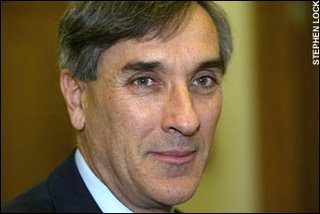 Telegraph
Telegraph editor Melissa Kite reports on 3 September in "
We must cut tax as a matter of morality, senior Tories insist". John Redwood MP is the chairman of No Turning Back and head of UK Conservative Party leader David Cameron's policy review on economic competitiveness. "
If you keep the proportion spent on public services down, you can benefit from lower taxes and faster growth, giving you a better rate of increase in the amount of money you have available for public spending. Lower tax rates represent a win win." "Lower taxes are not a desirable extra you can add when everything is going fine. Lower tax rates are the way to get everything going well." "
Taxation at best is compulsory charity. At worst it is theft by kleptocrat politicians. There is nothing moral about demanding high taxes from people. It is one of the distortions of the British debate to accept that public spending is good, and private spending is selfish. Public spending includes the money to pay for the entertainments of those who rule us, the cash to buy fireworks displays, banquets and civil servants to manage the lives of ministers." "
Private spending includes the money families spend on their children, the cash to pay for care for elderly relatives." "
Who dares say that it is morally right for government to waste so much of other people's money on a centralised health computer system? Or right to subsidise the empty Dome? Or good to increase spending on consultants to £3 billion- a year? Or uplifting to spend £20 billion on mending the railway, which still does not perform as well as it did when they took it on?" The pamphlet argues that a low tax economy is more moral because it leaves people with the choice of "whether to indulge ourselves, or give to charity". "
Of course some state spending is good. We welcome the payments to the disabled, who need the help of other taxpayers to enjoy some of the benefits of our rich society." "
We do begrudge the money wasted on regional government, on Regional Development Agencies in England, on health reorganisation, police reorganisation, on EU waste and fraud and the growing army of regulators." It declares there is "
colossal waste in public spending". While Gordon Brown had outlined plans to cut expenditure in some government departments by five per cent, "
bigger reductions are possible and should be pursued more vigorously". Although it backs the leadership's stance that a Conservative government will share the proceeds of growth between lower taxes and spending on services, the pamphlet adds: "
It is important to remind people that we can have our cake and eat it. If we raise the growth rate of the UK economy, there can be substantially more money for tax rate cuts and for better public services."



